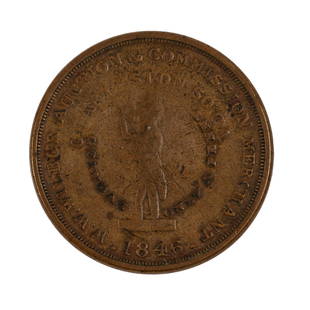
Rare Amistad Speech on the Floor of the House of
Similar Sale History
View More Items in Wine & SpiritsRelated Wine & Spirits
More Items in Wine & Spirits
View MoreRecommended Collectibles
View More


Item Details
Description
Rare Amistad Speech on the Floor of the House of Representatives
Whig Congressman John A. Rockwell of Connecticut rejects President James K. Polk's recommendation that the United States pay Spain $50,000 for the Amistad, a Spanish ship taken over by enslaved Africans off the coast of Cuba in 1839 and steered to the United States, where a U.S. revenue cutter intercepted the ship and took it into port in Connecticut. The resulting legal dispute over ownership of the vessel and the Africans aboard went to the U.S. Supreme Court, where former President John Quincy Adams represented the Africans. The U.S. Supreme Court upheld the verdicts of the lower federal courts with regard to the ship but freed the slaves immediately. Abolitionists funded their return to Africa.
[SLAVERY.] John A. Rockwell, Printed Document, Speech in the U.S. House of Representatives, August 8, 1848, Washington, D.C. 8 pp., 6.25" x 9.75". Uncut and printed on a single folded sheet; very good.
Excerpts
"In pursuance of the recommendation of the President of the United States, the Senate have added to the civil and diplomatic appropriation bill an amendment providing for the payment to the Spanish Government of fifty thousand dollars for the benefit of the owners of the schooner Amistad and the negroes on board. As there will be no time, at this late period of the session, to debate the important questions arising out of this amendment, when it comes to-morrow before the House, I avail myself of the present opportunity to recall to the recollection of members the facts in relation to this demand."
"The claim is not a new one. It has been often before this House, and has always been rejected. During the last Congress it found but some thirty or forty votes in its favor. The claim is not only untenable, but most preposterous.... When stripped of all its covering, it is neither more nor less than a demand that the United States shall pay for the value of persons as slaves who never were slaves—who not only were never shown to be slaves by any proof whatever, but were proved positively to be, and always to have been, free...."
"I regret to say, sir, that most of the leading actors in this horrible business were northern men from the free States, who had not the excuse of early habits and prejudices of persons from the slave States. It is ever so. When, on this question of slavery, men born and bred at the North, with all the fixed opinions and deep feelings of northern men, from ambition or baser motives, sell themselves to the South, they shrink from nothing, but are ready to do the dirtiest jobs, and perform the vilest services."
Historical Background
When La Amistad ("Friendship"), a Spanish ship, left Havana, Cuba, on June 27, 1839, it carried 53 enslaved Africans for a four-day voyage to another part of Cuba. Contrary winds slowed the voyage, and Cinqué freed himself and the other captives on July 2. The Africans killed the ship's captain and the cook, while two sailors escaped in a lifeboat, and two Africans were also killed. The remaining Africans kept two Spanish sailors alive to navigate the ship and a creole to be an interpreter, with the goal of returning to Africa. Instead, the crew deceived the Africans and steered the ship to the East Coast of the United States. On August 26, 1839, the U.S. Revenue Cutter Service ship Washington discovered the vessel off the eastern coast of Long Island, New York. Lieutenant Thomas R. Gedney, the commander of the USRCS Washington, took custody of La Amistad and the Africans and took them to New London, Connecticut, where he presented a claim for his property rights in the salvage of the ship and cargo, including the slaves, under admiralty law. Gedney allegedly chose to land in Connecticut rather than New York because slavery was technically still legal in Connecticut.
Many parties claimed the ship and its cargo of goods and slaves, including Lieutenant Gedney, the two Spanish crewmembers, the U.S. Attorney for the District of Connecticut on behalf of the Spanish government, the Africans, and others who claimed goods or individual slaves onboard. The British government, eager to suppress the international slave trade, exerted pressure on the United States to release the Africans, while the Spanish government insisted that only a Spanish court should consider the case. Meanwhile, American abolitionists formed the "Amistad Committee," led by New York merchant Lewis Tappan, to raise money to defend the Africans. The abolitionists charged the Spanish sailors with assault, kidnapping, and false imprisonment, and they were arrested in New York City in October 1839, outraging proslavery advocates and the Spanish government. Both posted bond and left for Cuba.
On January 7, 1840, all the parties appeared before the U.S. District Court for the District of Connecticut to present their arguments. The abolitionists argued that the Africans had been seized on the west coast of Africa and brought to Cuba in a Portuguese ship in violation of international treaties against the transatlantic slave trade. Democratic President Martin Van Buren, concerned about the relationship with Spain and unwilling to alienate southern voters, favored the Spanish position that the Africans be returned to Cuba. However, the district court ordered that the Africans be delivered to the custody of the President for return to Africa, awarded one-third of La Amistad and its cargo to Lieutenant Gedney as salvage, awarded another third to Spanish merchants with claims to some of the cargo, and ordered the slave Antonio returned to Cuba as the personal property of the vice-consul of Spain. The U.S. Attorney in Connecticut, by order of President Van Buren, immediately appealed to the U.S. Circuit Court. In April 1840, the Circuit Court upheld the district court's decision, and the U.S. Attorney appealed to the United States Supreme Court.
The Supreme Court heard oral arguments in February and early March 1841. Attorney General Henry D. Gilpin (1801-1860) argued that the Africans were slaves and should be returned to Spanish authorities in Cuba. Roger Sherman Baldwin (1793-1863) and former President and current Congressman John Quincy Adams (1767-1848) represented the interests of the Africans. On March 9, Associate Justice Joseph Story (1779-1845) delivered the opinion of the Court that upheld the decision of the U.S. district and circuit courts except for the fate of the Africans. Instead of turning them over to the President to be returned to Africa, they were to be freed immediately. Associate Justice Henry Baldwin of Pennsylvania dissented without comment, and Associate Justice Philip P. Barbour took no part in the discussion or decision of the case.
Abolitionists took the survivors, thirty-six men and boys and three girls, to Farmington, Connecticut, where they stayed while supporters raised funds for their return to Africa. In 1842, the Africans sailed to Sierra Leone, along with several missionaries who constructed a mission in Mendiland. Although southern members of Congress and Presidents James K. Polk and James Buchanan sought to compensate the Spanish government for La Amistad, its cargo and slaves, the majority in Congress refused to pass such legislation.
John A. Rockwell (1803-1861) was born in Connecticut and graduated from Yale College in 1822. He studied law, gained admission to the bar, and practiced in Norwich. He served as a member of the state senate in 1839 and as a judge of the county court. He was elected as a Whig to Congress and served from 1845 to 1849. He was an unsuccessful candidate for reelection in 1849 and practiced in the court of claims in Washington, D.C. He joined the call for a Constitutional Union Party in 1860 and was a member of the party's National Committee.
This item comes with a Certificate from John Reznikoff, a premier authenticator for both major 3rd party authentication services, PSA and JSA (James Spence Authentications), as well as numerous auction houses.
WE PROVIDE IN-HOUSE SHIPPING WORLDWIDE.
Buyer's Premium
- 25%
Rare Amistad Speech on the Floor of the House of
Shipping & Pickup Options
Item located in Wilton, CT, usPayment

Auction Curated By










































































![George Washington Signed Discharge: Partly printed discharge document signed by George Washington, as Commander in Chief of the Armies of the United States. Newburgh, [New York], 4 January 1783. 1 page, ## x ## in. Undersigned by Washin](https://p1.liveauctioneers.com/7226/322253/173251475_1_x.jpg?height=310&quality=70&version=1710004847)


